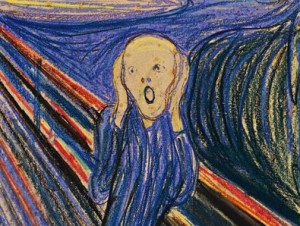Jeremiah 3:23 can be a little confusing unless you understand the context. It says, “Truly the hills are a delusion, the orgies on the mountains. Truly in the LORD our God is the salvation of Israel.” The thing that caught my attention first was that there are really only two  comments in this verse. They both begin with the word “truly.” First, it’s a comment on the unfulfilling character of sin. The pagan practices on the “high places” or “hills” had drawn Israel into some extremely radical religious practices. These practices involved sexual promiscuity and even cult prostitution. The “hills” and the “mountains” of pagan practices, as Craigie puts it, “were in reality a sham; the words spoken there, for all their promise of fertility and prosperity, were essentially no more than “murmurings,” words without true substance. For Israel, “salvation” (victory, deliverance) could only be found in the one true God of the covenant.”[1]
comments in this verse. They both begin with the word “truly.” First, it’s a comment on the unfulfilling character of sin. The pagan practices on the “high places” or “hills” had drawn Israel into some extremely radical religious practices. These practices involved sexual promiscuity and even cult prostitution. The “hills” and the “mountains” of pagan practices, as Craigie puts it, “were in reality a sham; the words spoken there, for all their promise of fertility and prosperity, were essentially no more than “murmurings,” words without true substance. For Israel, “salvation” (victory, deliverance) could only be found in the one true God of the covenant.”[1]
Feinberg has a similar understanding. He writes, “Once more the way to ruin and the way of deliverance are stated. Idolatry with its wild and clamorous excesses is the way of death, but the way of salvation and life is in the Lord.”[2] When we read the prophets condemnation of the sins of Israel it’s not readily apparent that the same experiences have been part and parcel of every generation of mankind from the days of Adam to our own day. As Ryken observes, “Jeremiah is not just a book about what happened to Judah; it is a book about what happens to anyone who abandons God.” The ultimate cry of the wasted life discovered in the pigsty of prodigal children is not new to any generation. The “vanity” of the pursuit of pleasure, possessions and prestige has been experienced in ever era and is being experienced in our own day as well.
There is ample evidence of that. Ryken continues his commentary, “Loud cries may be heard from the barren heights of our own culture. We hear the cries in modern art, as in Edvard Munch’s painting The Scream, in which a wraithlike figure stands on a bridge, holds his ears, and howls in agony at the world. We hear the cries in modern literature, as at the end of T. S. Eliot’s poem The Hollow Men: This is the way the world ends. This is the way the world ends. This is the way the world end. Not with a bang but a whimper. We hear cries from the barren heights of the families of our nation, like in Merton P. Stromann’s books Five Cries of Youth and Five Cries of Parents. We can even hear them from within the womb in ex-abortionist Bernard Nathanson’s famous film, The Silent Scream. Many people hear the same cry welling up from somewhere deep within the soul. It is a cry from the barren heights, the weeping and pleading of people who have perverted their ways and forgotten the Lord their God.”[3]
[1] Peter C. Craigie, Jeremiah 1–25, vol. 26, Word Biblical Commentary (Dallas, TX: Word, Incorporated, 1998), 65.
[2] Charles L. Feinberg, “Jeremiah,” in The Expositor’s Bible Commentary: Isaiah, Jeremiah, Lamentations, Ezekiel, ed. Frank E. Gaebelein, vol. 6 (Grand Rapids, MI: Zondervan Publishing House, 1986), 404.
[3] Philip Graham Ryken, Jeremiah and Lamentations: From Sorrow to Hope, Preaching the Word (Wheaton, IL: Crossway Books, 2001), 66.